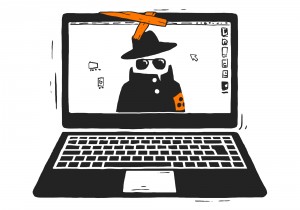


Jens Glutsch is a „Data Detox Consultant“ and far from being a technical pessimist. On the
contrary: the gentleman from Karlsruhe is of the opinion, that digital communication is important
and good, as long as it is used correctly. This is the reason why, he has made it his mission to
sensitize people to treat their data with caution, in order to effectively protect their privacy.
“The fear of losing control of my data is nothing, compared to the frustration and anger I feel when that thought crosses my mind. With the help of these 5 simple steps, anyone can pave the way to regaining control over their data sovereignty.”

I have taped my webcam!
It sounds a little paranoid. However, this is an absolutely legitimate and safe method to lock out unwelcome voyeurs in my laptop out of my life. Another benefit of the little sticker, is that it serves as a reminder to me, to never again carelessly risk the loss of my privacy.
Threema instead of Whatsapp
I make use of modern means of communication with great enthusiasm and certainly don’t want to pledge a return to the stone plaque and carrier pigeon. Nevertheless, instant messengers such as Whatsapp – sorry, bad habit, I don’t want to repeat the negative. I would much rather emphasize the positive.
So again: Instant messengers like Threema make an effective and fast communication possible. In our marketing driven world, it is not unusual for the inferior product to gain greater popularity. Just it once was – the older amongst you will remember – with VHS, the wretched video system, that won the battle against Betamax.
Although Whatsapp’s security happens to be grotesquely insufficient, however they still have a huge customer inflow.
I therefore call upon all of you: switch from Whatsapp to Threema and share your change with your peers. Threema offers the same functions as Whatsapp, but it is safe.
Krypto is cool and people, that use Krypto tend to have a better love-life and a much better connection to God. The Whatsappers, on the other hand, have a marvelous connection to the NSA.
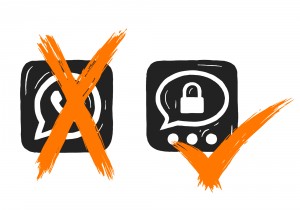
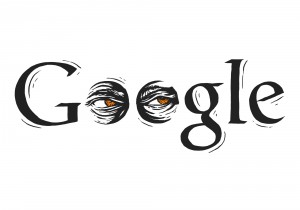
Google doesn’t have to know everything
Google earns its money by collecting information about its users, amongst other things. All well and good. Unfortunately, Google thereby generates a profile of each user: what you search for, where you are, where you were and if necessary, also where you will go to next. This realization made me somewhat angry. After all, it’s none of Google’s business, what I search for and where I was.
In order to stop feeding this data-Kraken information, I now use other search engines. Startpage.com, for example and DuckDuckGo, which don’t follow me and couldn’t care less about my whereabouts and where I’m planning to go next. And on top of it all, they even provide me with better search results than Google, and even filter my results as a special “service”.
After all, thanks to the profile generated by Google, Google knows better than you do what you search for and such paternalism happens to be quite commodious…
Data-minimising leads to a good life
My experience with Google showed me, that there are many businesses “out there”, who would love to get their hands on my data. Yet I don’t want that to happen, since once my data is “out there”, there is no way of getting it back. For this reason I now ask myself very consciously, before making use of an offer online what data to I need to hand over. Of course, every service provider would like to collect as much data about me as possible, because personal data is the strongest currency on the internet.
But even in the case, that a field is marked as mandatory, this data in needed only in very few cases for the provision of the service. A streaming-service doesn’t need your postal address, since it isn’t supplying an audio-stream by post, it’s sending it electronically. If an entry is expected nonetheless, then I recommend you to unleash your creativity or turn to “poow orthokraffie capabilities. Only the fewest forms actually examine the content (Thank god for the right to privacy…).
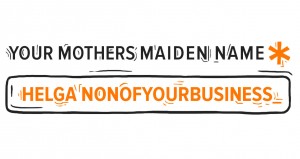
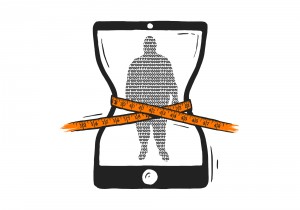
Data-dieting helps see clearer
I felt smothered by the flood of data. Data was streaming in on me from all over the place: News here, weather forecast there, a rating there next to a comment. I lost sight of what is important – my life and that’s why I chose to go on a data-diet.
As a self-experiment, I consistently abstained from reading the news or comments, and held off from giving ratings. I suddenly realize, that I live in the here and now much more consciously.
In the meantime, I selectively search for information, when I plan a trip or an event for the upcoming weekend, for example. That is how my data-dieting turned into a sustainable and healthy data-nutrition, that I have retained since the dawn of my self-experiment.
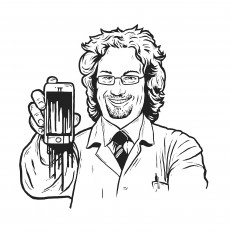
Jens Glutsch
Data Detox Counselor
The Master of Science in Computer Science will now regularly publish Data-Detox-Tips here on our site. The 42-year old spent the last 15 years working as a software developer and IT consultant.
This year, he began working as an independent consultant for Data Detox, privacy and data security.
Jens himself came to us with this idea. And if you too would like to get active for Free Your Data, please feel free to contact us at info@freeyourdata.org.
Thanks for the tips and the basics that we seem to have forgotten somewhere along the line. Ah the habits…that’s what businesses rely on, so thank you for giving alternatives…now to change those habits:-)
Thank you very much for these little tips and I look forward to any more you might have in store. I didn’t really need any of these but maybe the next ones will help me directly. Either way I’m glad that you try to directly help people who might not know how to effectively secure their privacy.
Could you please explain exactly how Threema is more secure than WhatsApp?